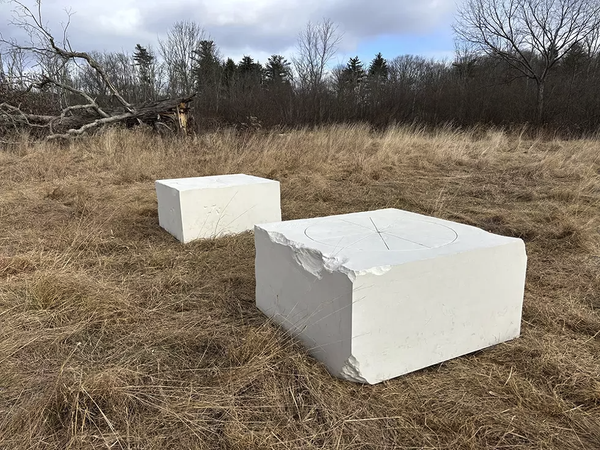Sky High Farm Launches Biennial with Art and Agriculture in Germantown
The farm's inaugural biennial unites 50+ artist to explore art, ecology, and food justice.

The farm's inaugural biennial unites 50+ artist to explore art, ecology, and food justice.

It’s not every day that a nonprofit farm throws a biennial featuring a mirrored floor by Rudolf Stingel, billboard work by Félix González-Torres, and sundials forged from wildfire wreckage—but then again, Sky High Farm has never been content to do things the normal way.
Founded by artist and former downtown prankster Dan Colen, the Germantown-based organization has grown from a socially conscious vegetable patch into a sprawling 560-acre think tank for radical hospitality, land-based education, and food justice. This summer, it adds contemporary art biennial to the resume.
Opening June 28, "Trees Never Bend and Houses Never End" is less a white-cube blockbuster than a post-industrial invocation of ghosts, gods, and garbage. Housed in a raw apple cold storage warehouse beside the Amtrak line, the show spills across mediums, disciplines, and species. Over 50 artists are participating—among them Rirkrit Tiravanija, Anne Imhof, Tschabalala Self, and Hudson Valley art legend Ben Wigfall (via his estate and historic project, Communications Village).

Artwork by Lyle Ashton Harris will be featured this summer at Sky High Farm.
Colen, who curated the show, describes it as a “demonstration of new structures and models, outside of industry and large institutions.” In practice, that looks like Pia Camil water-fountaining dead apple trees through Imhof’s compost-ready water tanks, the Harrison Studios’ Survival Piece #5: Portable Orchard growing in a windowless room, and González-Torres’s “Untitled” billboards dotting the Hudson corridor like environmental omens or spiritual affirmations.
The biennial’s title nods to the late artist and founding farmer Joey Piecuch, whose poetic scrawl—discovered in a crumbling barn—provides both its name and its North Star. Like Piecuch’s guerrilla installations, this show insists on a different kind of permanence: compostable, community-rooted, and stubbornly alive.
And if that sounds lofty, the biennial keeps its boots in the dirt. Artists donate proceeds on their own terms to fund food distribution, grants, and climate education. The water containers will become bioreactors. The sculptures will decompose. Even the mirrored floor might catch a glimpse of the Catskills before cracking under a muddy boot.
As Colen puts it, “Our work affects everyone”—and this exhibition doesn’t so much show the work as it invites us to join it. Which is to say: bring your compost bucket. And maybe a notebook. The art’s not just on the walls—it’s in the field, in the barn, and in the systems we choose to build next.